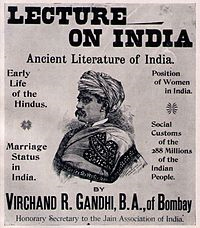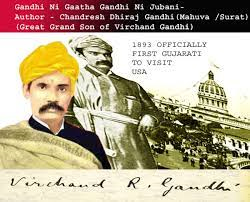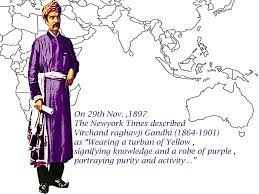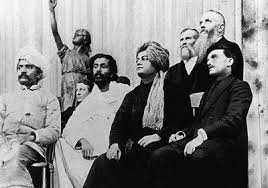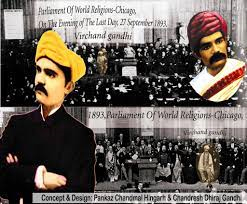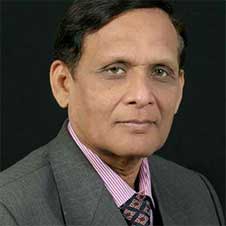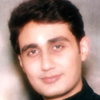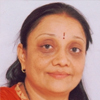The Literary World, Volume 51 (Page 60, 1895) wrote, “Virchand Raghavji Gandhi, BA, attacks missionaries in India, charging them with misrepresentation both in regard to the religion and the lives of the natives, and in regard to their own alleged self-sacrificing life.” A Boston Transcript report said, “He is an earnest and serious speaker, carving deep into the philosophies of India, of which he is one of the most able exponents that has ever visited America.” The New York Times described the personality of VRG as “wearing a turban of yellow, signifying knowledge, and a robe of purple, portraying purity and activity, Virchand Gandhi.” Buffalo Evening Times said, VRG “preaches the universal brotherhood of man. He is much farther advanced in esoteric philosophy than the Western theosophists and gives far more lucid explanations of the orient teachings. The Hindu is decidedly the lion of the season.”
Rev. Addison Parker commended, “He impressed me as one the brainiest and most stirring of the representatives of the Far East. I know of no one except him from whom I would prefer to hear facts concerning the life and thought of the great people he represents.” “He was the most important delegate from India to the parliament of religions,” Miss Lilian Whiting, a renowned writer of Boston, said of VRG.
VRG’s immense success was covered by the leading newspapers and periodicals of the USA: New York Times, St. Joseph Gazette, The Jamestown New York, Editors Bureau, Chicago Daily Sun, Chicago Herald, Chicago Suburban Star, Light of Truth, Cincinnati, Buffalo Times, The Illustrated Buffalo Express, Morning Star, Buffalo Evening Times, Buffalo Express, Buffalo Courier, The Evangelist, Evening Post, Rochester Democrat and Chronicle, The Rochester Herald, Rev. R. A. White, Chicago, Addison Parker Pastor of leading Baptist Church.
VRG wrote many articles and books in Gujarati as well as in English. He wrote on topics of social and cultural reforms like education for women and custom of repenting. VRG translated many publications, including The Unknown Life of Jesus Christ in English from French in 1894 from an ancient manuscript found in Tibet. And one should possess a copy of his scholarly translation.
In those days, sea voyage was considered unholy and VRG had to face unjust criticism. At the same time, his vegetarianism in the American cold surprised Swami Vivekananda, who wrote from 541, Dearborn Avenue, Chicago, to the Diwan of Junagadh in 1894, “Now here is Virchand Gandhi, the Jain whom you knew well in Bombay. This man never takes anything but mere vegetables even in this terribly cold climate and tooth and nail tries to defend his countrymen and the religion. The people of this country like him very well. But what are they doing who sent him over? They are trying to outcast him.”
Herbert Warren, a religious enthusiast, abandoned non-vegetarianism and adopted the Jain religion. He took notes from VRG’s lectures and wrote a book on Jainism. Helmut von Glasenapp, a well-known German scholar, wrote his doctoral dissertation on the Jaina Doctrine of Karma and acknowledged VRG’s influence. Hon. E. B. Sherman Master in the Chancery of the United States, Circuit Court, wrote on VRG, “It has rarely, if ever, been my good fortune to meet a man whose reading and culture have been so wide and varied, and who, withal, has so sweet, sincere and teachable a spirit as Mr. Gandhi”. E. Allen Richardson in “Strangers in This Land” mentioned about the parliament and VRG’s interview with the New York Times. VRG had eventually attained bar at law in both India and Britain. He had won the Piggery case and got the slaughterhouse removed from the sacred shrine of Jains called Samet Shikhar. He also resolved the Shatrunajay Tirth pilgrimage tax issue and got it abolished.
VRG’s death today also remains a mystery. From a 1902 letter of Mrs. Howard in Open Court we learn that VRG’s demise was due to haemorrhage of lungs. However, we learn from VRG’s descendants and local folks in Mahuva that he was given slow poison as he was seen as a future threat by a few fanatic people. Whatever may be the truth, the untimely demise of two heroes – VRG and Swami Vivekananda – proved tremendous loss for the nation. Otherwise, both must have contributed much more, and Mahatma Gandhi’s mission would have accelerated, and we would have been independent much earlier wanted to continue his activities for a long time and to accomplish much more but unfortunately, he could not, as this brilliant and promising young man, full of hopes and aspirations, died at a very young age of 37, on August 7, 1901. Today whatever is available about VRG is possibly just 10% of his contributions to the country and the religion. VRG left behind wealth and properties for his son which he inherited from his father.
Swami Vivekananda and Virchand Gandhi had their own huge fan following Swami Vivekananda’s work became well-known but unfortunately not much of VRG’s! One of the US periodicals wrote while paying tributes to both of them when VRG and Swamiji died in 1901 and 1902, respectively, “The influence of Vivekananda’s philosophy has been kept alive by his disciples by founding organizations whereas, it is a matter of great pity that no attempt has been made to keep alive VRG’s memory!” Today only 10% of VRG details are available due to a gap of 100 years. In India nobody maintained a detailed history of VRG and his contribution to India and the Indian society.” As a reformer in the Western countries, he established the Gandhi Philosophical Society and the Society for the Education of Women in India (SEWI) under whose banner several Indian women went to the USA for higher studies, the School of Oriental Philosophy, and the Jain Literature Society in London. He sent Rs 40,000 and a shipload of grains from the USA to India during the worst famine of 1896-97.
As a national figure he attended the Indian National Congress session held in Pune as the representative of the then Bombay province in 1895 and was an early leader of the Congress along with his friends Chief Justice Mahadev Ranade and Sr. Narayan Chandavarkar. Ex-Prime Minister Indira Gandhi (Congress president) with top Congress politician Vadilal Chitrabhuj Gandhi visited VRG’s house and met Dhiraj Mohanlal Gandhi, the grandson of VRG (a key person of Hindu Mahasabha, Mumbai) and paid homage to VRG.
Virchand Gandhi lectured on the political and industrial outlook in India in Large Hall of William Science building on December 19, 1898. Another international participation as All-India sole delegate was at the international conference of commerce in 1899 where he lectured on the trade relations between the USA and India.
Modern research about VRG reveals that at several instances Mahatma Gandhi was misunderstood as V R Gandhi.
In a June 13, 1931, letter, Mahatma Gandhi clarifies to Miss Emelia Mac Bean of Chicago when she mistook him as VRG, “Madam, I have your letter for which I thank you. You are giving me credit of which I am wholly undeserving. You are thinking of another Mr. Gandhi my namesake but in no way related to me. He and I were, however, friends and lived together for some time. You will be sorry to hear that he died many years ago, leaving an only son. It was he who visited America and made many friends. I have never had the privilege of visiting your continent.”
Mark Twain, father of American literature, was too impressed by Virchand Gandhi and his philosophy. His newspaper Buffalo Express had widely covered VRG when Mark Twain visited India. VRG displayed his hospitality and accompanied him to Byculla, Mumbai Jain temples on 25 January 1896. In his ‘Mark Twain on Biblical and Hindu Miracles’, GB Singh states that Virchand Gandhi had met Mark Twain on his visit to India but somehow ‘Inventing Mark Twain: The Lives of Samuel Langhorne Clemens’ by Andrew Hoffman mistook Virchand Gandhi as Mahatma Gandhi. Mahatma Gandhi, at this stage of Mark Twain’s travel, was living in South Africa.
H.S. Olcott was lawyer and the cofounder and first president of the Theosophical Society. Pyarelal in his book ‘Mahatma Gandhi’ also brings to our notice that it was Virchand Gandhi who lectured at Blavatsky Lodge, where H.S. Olcott presided over the function (Old Diary Leaves – Henry S. Olcott) and they interacted with each other and in his diary he mentioned VRG as a “distinguished Jain”, but Josephine Ransom seems to have mixed up M.K. Gandhi with Virchand Gandhi and wrongly mentioned that Olcott was introduced to M.K. Gandhi and this time also M.K. Gandhi was in South Africa.
Old Diary Leaves by H.S. Olcott mentions, “A profound impression was created by the discourses of Professor GN Chakravarti and Mrs Besant, who is said to have risen to unusual heights of eloquence, so exhilarating were the influences of the gathering.” Besides those who represented our society and religions, especially Vivekananda, VR Gandhi, Dharmapala, captivated the public, who had only heard of Indian people through the malicious reports of interested missionaries, and were now astounded to see before them and hear men who represented the ideal of spirituality and human perfectibility as taught in their respective sacred writings.
Said one Chicago editor: ‘We have been for years spending millions of dollars in sending missionaries to convert these men and have had very little success; they have sent over a few men and have converted everybody.”


